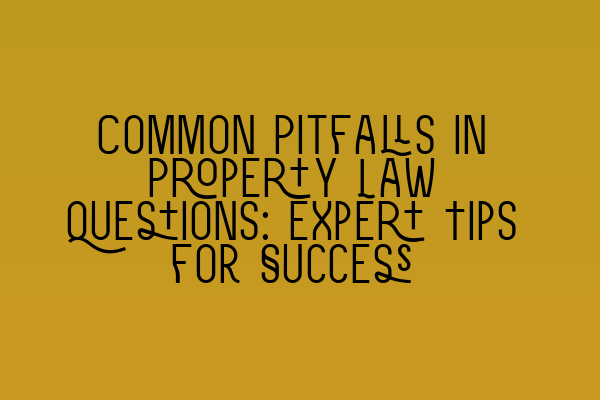Common Pitfalls in Property Law Questions: Expert Tips for Success
As solicitors specializing in property law and land law, we understand the difficulty that students and aspiring legal professionals face when tackling property law questions. The intricate nature of property law can often make it a challenging subject to master. However, with the right approach and a solid understanding of common pitfalls, you can navigate these questions with confidence. In this blog post, we will provide you with expert tips for success in property law questions, helping you avoid common mistakes and achieve the results you desire.
1. Failure to Understand the Legal Framework
One of the most common pitfalls in property law questions is a lack of understanding of the legal framework. Property law is governed by a complex set of rules and principles, and it is crucial to have a firm grasp of these fundamentals. Familiarize yourself with the key statutes, such as the Law of Property Act and the Land Registration Act, as well as landmark cases that have shaped property law.
To deepen your understanding of the legal framework, we recommend exploring our comprehensive SQE 1 Preparation Courses. These courses cover all the essential topics and provide in-depth analysis to help you tackle property law questions confidently.
2. Neglecting the Importance of Land Registration
Land registration is a critical aspect of property law, and it is essential to consider the implications of land registration in your answers. Failure to address land registration issues can cost you valuable marks in property law questions. Make sure to identify whether the property in question is registered or unregistered and analyze the consequences accordingly.
For a comprehensive understanding of land registration, we recommend checking out our related article on the importance of SRA SQE Exam Dates. This article provides valuable insights into land registration and its significance in property law.
3. Overlooking Easements and Covenants
Easements and covenants are often tested in property law questions, and failing to consider their impact can be a major pitfall. These legal concepts play a crucial role in determining the rights and obligations associated with a property. Analyze the nature of the easements and covenants involved and consider their effect on the parties involved.
To strengthen your knowledge of easements and covenants, take advantage of our SQE 1 Practice Exam Questions. These practice questions are specifically designed to test your understanding of key property law concepts, including easements and covenants.
4. Inadequate Application of Case Law
Property law is built upon the foundation of case law, and failing to apply relevant cases can significantly undermine your answers. When faced with property law questions, be sure to refer to relevant case law and analyze how it relates to the issues at hand. This demonstrates a deeper understanding of the subject matter and shows your ability to apply legal principles in practical scenarios.
To further enhance your understanding of case law and its application in property law, explore our SQE 2 Preparation Courses. These courses provide comprehensive coverage of relevant case law and offer valuable insights into its practical implications.
5. Insufficient Consideration of Remedies
Property law questions often revolve around disputes and conflicts that require the application of legal remedies. It is crucial to identify the appropriate remedies available and discuss their implications in your answers. Neglecting to address the remedies can significantly impact the overall effectiveness of your response.
For additional practice in applying remedies in property law questions, try our SQE 1 Practice Mocks FLK1 FLK2. These practice mocks simulate real exam scenarios and give you the opportunity to hone your skills in analyzing and applying remedies.
In conclusion, property law questions can be complex, but with the right approach and a solid understanding of common pitfalls, you can excel in your responses. By familiarizing yourself with the legal framework, considering the importance of land registration, analyzing easements and covenants, applying case law effectively, and discussing remedies, you will be well-prepared to tackle property law questions with confidence.
For further resources and support in your preparation for property law questions, visit our website and explore our comprehensive SQE 1 and SQE 2 Preparation Courses. Remember, practice makes perfect, so take advantage of our SQE 1 Practice Exam Questions and SQE 1 Practice Mocks FLK1 FLK2 to refine your knowledge and skills.
Good luck in your property law studies and remember that SQE Property Law & Land Law is here to support your success!
